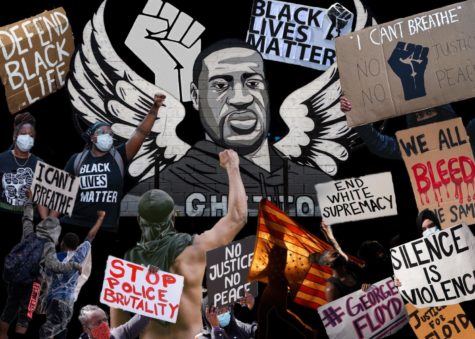George Floyd: Our reminder of work to be done
March 9, 2022
Content Warning: The following article contains subject matter pertaining to murder and violence.

We are approaching two years since Minnesota police officers murdered George Floyd. When the video of his killing was circulated online, I watched him beg for air, water and his mother. I watched him die. I remember hearing his pleas and feeling completely powerless. By the time I watched the video, he was already dead. Another Black man murdered in America.
After the shock faded, and I was forced to confront my feelings about his murder, I did what a lot of people do in the face of injustice. I got mad. I was mad at the system and at my friends who didn’t care. I was mad at the politicians with empty promises and the barrage of apathy and malice that was pouring out on all forms of media. I wish I could tell you I was moved to change the world, or I found a bright spot in the chaos — that I saw some wonderful silver lining in the murder of a man who could very easily have been me. But I did not. Wherever I looked, I only saw people hurting.
I went to the protests in Washington D.C., hoping to find some diamond in the rough, and marched. I walked alongside all sorts of people, united in protest and prayer and perseverance. When the march ended, and I came home, the anger was still there. No amount of marching or campaigning or writing would get rid of it. I was not a witness or prosecutor, and I certainly was not a judge. All I could do, all any American could do, was watch.
There was no joy in learning that Derek Chauvin was sentenced for 22.5 years, or that his partners were also being prosecuted. No faith was restored in the system that enabled Floyd’s murder. When asked about how the sentencing made me feel, I remember saying that I was just tired. The justice system didn’t overcome any great adversity; it didn’t succeed in spite of some horrible external pressure. It reminded Americans that justice and safety are not guaranteed — something that minorities are already painfully aware of.
Now, two years later, some might wonder why I’m bringing him up. Why should we discuss a man who was killed two years ago, particularly as the social movements his murder popularized are once again fading to the background? Why can’t we just move on?
Floyd’s death was a watershed moment, and just because the spotlight shifted away from it does not mean the moment ceases to be relevant. As the immediate shock fades, America still has to pick up the pieces. It has to gather all the broken trust of its minority citizens and build something stronger. The consequences of the nationwide trauma that was Floyd’s death will leave scars. The nation will not move on from the incident so much as accept it as part of history and act accordingly.
We cannot move on from Floyd because he is a reminder of all the work that still must be done. Given that minority Americans are still victims of hate crimes and systemic failure, it’s obvious that progress still needs to be made. Until we have created a more perfect society, where minorities do not live in fear of being murdered, we cannot move on from Floyd. We can only use him as a lesson.
All Tulane students can reach out to Case Management and Victim Support Services at 504-314-2160 for support and help filing a report. In addition, Tulane University Police Department’s non-emergency Uptown number is 504-865-5381. If you need urgent help, call TUPD at 504-865-5911.
For LGBTQ+ students, the Trevor Project provides crisis intervention services to those under 25 and can be reached at 866-488-7386.








Leave a Comment